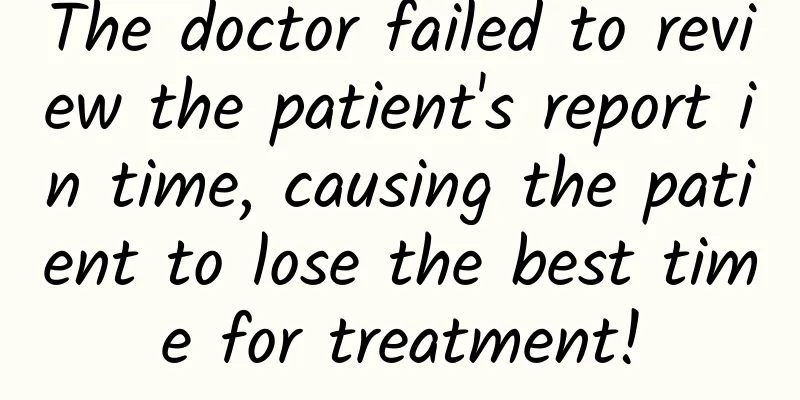The doctor failed to review the patient's report in time, causing the patient to lose the best time for treatment!

|
This incident happened in Japan. A middle-aged female patient in her 50s underwent a chest and abdominal CT scan at the Nagoya University Medical Hospital. The patient was diagnosed with urinary tract stones and was discharged after treatment. A few days later, the radiologist found that the patient had lung abnormalities and possible tumor lesions, and recommended a follow-up examination in 3 months. However, the responsible clinician did not review the report and did not inform the patient of the discovery of lung tumor and follow up on time. Thirteen months later, the patient was found to have lung abnormalities during an examination at another hospital and went to Nagoya University Hospital for treatment again. At this time, the lung tumor had progressed significantly. Despite nearly two years of treatment, the patient eventually died of the tumor. Nagoya University Hospital of Medicine explained the situation to the patient's family, made a public apology, and promised compensation. What I want to say is, are apologies useful? As a doctor, I shouldn't say these words. But compared to life, what can be greater than the sea of life? The situation in China is not optimistic either. Although we have not heard of such serious incidents anywhere, the increasing number of specialties and the increasing number of patients are bound to be a hidden danger. The so-called specialization means that the liver, gallbladder, stomach, spleen, pancreas, etc. were originally under the jurisdiction of general surgery. However, now they are divided into gastrointestinal surgery, hepatobiliary surgery, etc. This classification can certainly make doctors more professional in the corresponding field, but their horizontal knowledge will be lacking. For example, in the process of liver tumor resection, lesions in the intestine may be ignored. The tumor in the liver may be metastatic from the intestine, or it may be double cancer. If it can be discovered and removed in one operation, it will inevitably give patients the opportunity for early detection and early treatment. Perhaps one discovery means a life. Let's talk about multidisciplinary skills: surgeons in the past would listen to lung breathing sounds, heart sounds, and read electrocardiograms. What about now? How many of them can do that? How many doctors still wear stethoscopes around their necks? You know, a stethoscope can detect many problems at the first sight! At this time, some surgeons asked: Isn't there a respiratory department? Isn't there a cardiology department? Besides, isn't there an anesthesiology department to check? Yes, these are possible. However, if the situation can be discovered immediately, can the patient be treated immediately? Can many risks be eliminated as soon as possible? Surgeons who read this article should not be angry. We hope that everyone can have a deeper attainment in their respective professional fields. At the same time, we should not ignore the horizontal development of knowledge. After all, the patients we treat are a whole body. Some diseases are not caused by one organ being damaged, but by other organs that affect each other. Welcome to collect and forward, click to follow, you can watch more professional medical popular science and decipher the things about the operating room for you~ |
<<: Why is grapefruit sour and bitter? When is grapefruit eaten?
Recommend
How to eliminate bad breath during pregnancy
People with bad breath must take certain effectiv...
Why do I have periods again a week after my period ends?
Women should pay attention to the observation of ...
What causes women to have lower abdominal distension and frequent urination?
Generally, our urination frequency is relatively ...
Xianju emergency contraceptive capsules
Emergency contraception will cause certain advers...
Thyroid function test details: the intertwined influences of age, gender, medications, and disease
Author: Liu Xiangyi, Professor of Beijing Tongren...
Do I still need to wear a mask after I test positive? Which mask is the most effective? Find out in one article!
Do I need to continue wearing a mask after testin...
What can I eat to relieve vomiting in early pregnancy?
Women may experience pregnancy reactions in the e...
What to do if you have a fever while preparing for pregnancy
Many married couples have their own plans for whe...
How many times a night is normal for a girl
Sexual life can enhance the relationship between ...
What should pregnant women do if they have ear pain?
Some pregnant women have health problems, so they...
My period is 9 days late, what's going on?
The specific menstrual cycle time varies for each...
How to increase the chance of having twins? It turns out that you can adjust your diet
Having twins has always been the dream of many yo...
How to treat high testosterone in girls
High testosterone is a common female endocrine im...
How to remove pimples on the areola
Many female friends will encounter the situation ...
Who are the people who should eat black truffles? How to eat black truffles
Black truffle is a product suitable for both men ...









